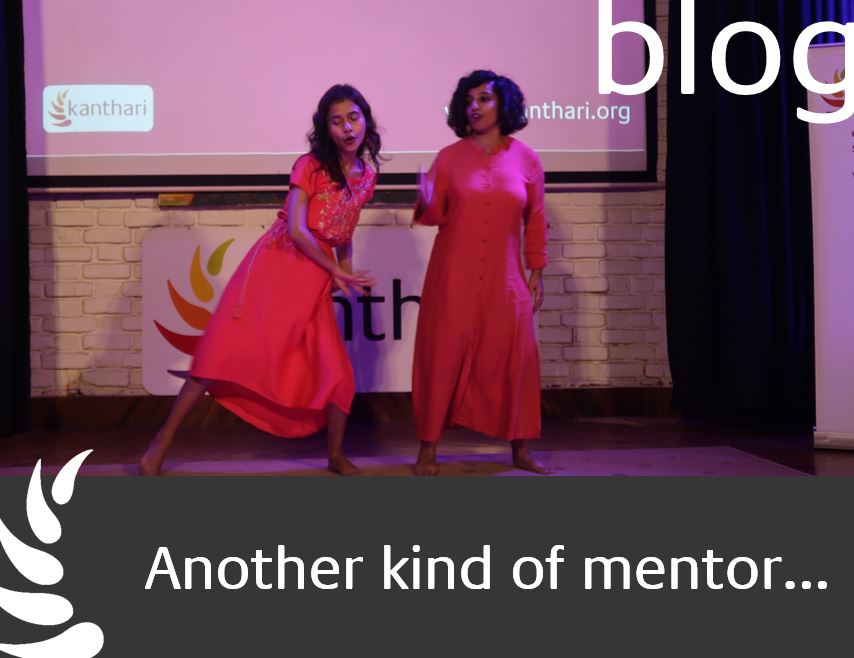Another kind of mentor
by Meghana Raveendran, a kanthari graduate of 2019
“If you cannot see where you are going, ask someone who has been there before.” – J Loren Norris
This quote by Lorena Norris is a peak into what we at kanthari believe mentoring is all about.
For years we have seen that mentoring is usually done in a hierarchical form. We however, believe a good mentor is someone who is at a senior position in life, who is older to us, who has climbed the ladder of success and now wants to give back. It is quite common for a hierarchical mentoring relationship to turn into a student teacher relationship because of the importance given to the hierarchy.
This works for some who wish to be more at the receiving end of knowledge and who later wish to give back in terms of outcomes of success. But that is something that we at kanthari are a bit skeptical about.
A couple of years ago Sabriye and Paul continued to put in tremendous efforts to continue mentoring all kantharis even after they graduate, they sensed there was a very visible gap. Though kanthari believes in being a flat hierarchical organisation, most of us participants come from cultures where a top-down hierarchy is the norm. It is quite difficult to break this cycle. Being mentored by someone who has more than 20 years of experience could get overwhelming for mentees too. This motivated Sabriye and Paul to figure out alternative ways so kantharis could continue to be mentored but more in a way where there is mutual learning, transparency, less hesitation and where they do not get overwhelmed by mentor’s history.
In 2018, Sabriye and Paul started involving a few alumni in mentoring the new graduates. The idea was to find a path between having an experienced mentor and a peer mentor. Someone who had recently, while initiating their projects been through the same struggles. Someone who had experienced similar challenges in their personal lives due to the commitment to be an ethical social changemaker. Someone who came from similar cultural backgrounds. And eureka! As a kanthari graduate myself, the connection I felt with my mentor, Sristi KC from Nepal was very mutual and reliable. Sristi is a 2012 kanthari graduate, blind and is the founder of a non-profit organisation called Blind Rocks! (http://www.blindrocks.org). We could exchange experiences, speak about similar challenges we faced, talk about how this impacted our personal lives while also meeting professional commitments that we had both agreed upon.
The power dynamics when being mentored by someone who has closely experienced your challenges is negligible when compared to someone who has only theoretical knowledge, who has never had the same experience because of he/she has been in a certain privileged position or who hails from a different cultural background which disconnects them from their mentees.
This experience really made us understand the power of alumni mentors. Usually, an alumni who has a similar area of interest as a participant or who comes from a similar cultural background will be paired with the new participant or graduate to ensure there is a reliable connection. From this year we involve the kantharis right in the preparatory phase itself, the Act-0. Which means participants are mentored by alumni as soon as they are starting the course. This helps them understand what to expect and what is expected from the perspective of a fellow kantharis, discuss their personal challenges and get access to the knowledge gained by their mentors. kanthari alumni continue to mentor the new graduates after they get back to their homes when they start to set up their organisations.
To kickstart this new model of mentoring, we recently had our very first online meeting of this year for the preparatory phase. In my role as knock coordinator, I was a part of this meeting. It was heartening to see the excitement, effort, the eagerness to learn from mentees and be part of the support system during the course. It makes my belief a lot stronger that the more hierarchical we are, the less we learn. Mentors are partners. Partners who have been through experiences and not just possess theoretical knowledge. Whose growth you can visually see because they were able to break barriers and continue to do so.
Keep watching this space to know about how being a partner as a mentor impacts our kantharis.

